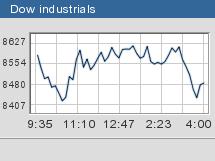
NEW YORK (CNN/Money) -
Stocks tumbled in a late-session selloff Tuesday, as upbeat comments from Federal Reserve Chairman Alan Greenspan about the U.S. economy kept sellers at bay for only so long.
The decline was the seventh straight drop for the Dow Jones industrial average, and was disappointing to some investors who were looking for a continuation of the late rally that pulled the Dow back from a 439-point decline Monday.
The 30-share Dow lost 166.08, or 1.9 percent, to close at 8,473.11. The Nasdaq composite index fell 7.36, or 0.5 percent, to 1,375.26, and the Standard and Poor's 500 index slipped 16.88, or 1.02 percent, to 901.05.
"The coin flipped from head to tails and they decided to sell them at the end today," said Patrick Boyle, head financial trader at Credit Suisse First Boston.
"You have Intel that reports tonight, so you saw a pretty decent run on the semis and that took technology with it early," Boyle said. "But then you're seeing a little bit of profit-taking just in case that Intel number isn't quite as good as people hoped it would be."
After the bell, Intel (INTC: up $1.08 to $19.44, Research, Estimates) reported a second-quarter profit of 9 cents per share on $6.3 billion in revenue, falling short of recently reduced estimates. The chipmaker also said it will eliminate roughly 4,000 jobs in the second half of the year.
The markets stabilized briefly after Greenspan expressed optimism about the future health of the U.S. economy, while acknowledging that corporate scandals were indirectly hurting business spending.
Greenspan soothes markets, for a bit
"The fundamentals are in place for a return to sustained healthy growth," Greenspan said as part of his semi-annual report to the Senate on monetary policy.
"I think [Greenspan] had a calming effect once all the returns were in and people had the opportunity to reflect on what he said," Phil Dow, stock market strategist at RBC Dain Rauscher, told CNNfn's Halftime Report.
But the skepticism that has kept the major indexes from breaking into a strong advance continued to dog the markets.
"Earnings look OK and it looks like there's some pretty good bargains, but where's the demand going to come from?" said David Briggs, head of equity trading at Federated Investors.

Two Dow Jones industrial average components reported better-than-expected quarterly results.
General Motors (GM: Research, Estimates), the world's No. 1 carmaker, posted higher second-quarter earnings of $2.43 a share, a penny above estimates and higher than the $1.26 a share earned one year earlier.
Drugmaker Johnson & Johnson (JNJ: Research, Estimates) said it earned 60 cents per share, 2 cents above estimates and better than the 51 cents posted a year earlier.
But Dow component Caterpillar (CAT: Research, Estimates) said its quarterly earnings fell as machinery and engine sales dropped. The company earned 58 cents per share, sharply below estimates and the 78 cents earned one year earlier.
Just before the opening bell, the Federal Reserve said industrial production rose 0.8 percent last month after a revised 0.4 percent gain in May. The Fed also said capacity utilization rose to 76.1 percent in June from a revised 75.6 percent in May. Economists, on average, expected production to rise 0.4 percent and capacity utilization to rise to 75.8 percent, according to Briefing.com.
European markets stumbled, while Asian-Pacific stocks finished lower Tuesday, with Tokyo's Nikkei index down 1.2 percent.
Treasury prices fell in early trading, sending the 10-year note yield up to 4.69 percent from 4.61 percent late Monday.
Light crude oil futures rose 72 cents to $27.74 a barrel in New York, where gold sank $2.40 to $317.50.
Market breadth ended negative. On the New York Stock Exchange, losers beat winners nearly 3-to-2 as 1.82 billion shares changed hands. On the Nasdaq, decliners just edged advancers as 2.35 billion shares traded.

|

